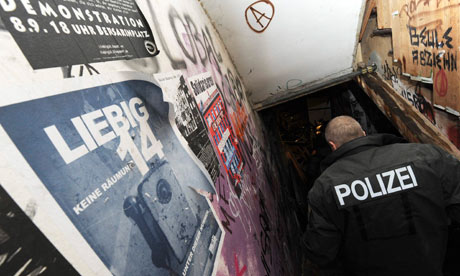Berlin commune eviction results in arrests and huge protests
by editor | 3rd February 2011 8:15 am
![]()
Eviction of Liebig 14 former squat in Friedrichshain takes five hours and 2,500 police to counter protesters [1]
[1]Helen Pidd in Berlin
A German police officer walks downstairs in the large house of the Liebig 14 commune after a five-hour struggle. Photograph: Rainer Jensen/Pool/Reuters
It took German police five hours to evict tenants from one of Berlin’s last former squats today after angry residents booby-trapped the house.
There were dozens of arrests after 2,500 police officers were deployed in a huge operation to clear the Liebig 14 commune in the eastern district of Friedrichshain.
The 25 residents had refused to leave after losing a lengthy legal battle that has become a focus point for the anti-gentrification movement in Berlin and other German cities.
Six men and three women were found in the property when the police and bailiffs finally gained entry using axes and sledgehammers to break through barricades of barbed wire, sharpened metal poles and concrete blocks.
Police said they used pepper spray after they were showered with fire extinguisher fluid inside the building. The eviction was delayed after police found a number of baths in the hallway filled with a mysterious liquid with wires poking out.
The baths turned out to be harmless, but the nine residents were arrested, along with 21 protesters outside the house and around the city.
After turning up at the protest on his purple bicycle, the local Green MP, Hans-Christian Ströbele, said alternative housing projects like Liebig14 were one of Berlin’s trademarks and should be protected rather than destroyed.
Over a thousand protesters gathered outside the commune for the planned eviction at 8am. They waved banners, banged wooden spoons on saucepans and shouted at police who got up on to the roof of the house during the night. On the street more officers in full riot gear blocked all access routes to the building.
There were demonstrations and publicity stunts across Berlin and beyond throughout the day. By lunchtime protesters claimed to have paintballed the famous department store KaDeWe, Berlin’s answer to Harrods, along with the town hall in the district of Schöneberg, where John F Kennedy gave his “Ich bin ein Berliner” speech in 1963.
Solidarity protests were taking place in Saarbrücken, Göttingen, Tübingen, Düsseldorf, Freiburg, Hamburg and Copenhagen, according to the Liebig14 Twitter feed.
The big house – which according to one resident has 25 bedrooms, four kitchens and five bathrooms – was first squatted in 1990, shortly after the Berlin Wall fell, when the city became a mecca for squatters because of the large number of empty buildings. After Berlin’s housing board took ownership of the house in 1992 the squatters signed a lease making them the legal residents.
Even after the house was sold to private developers the lease was passed on to the current occupiers, who are between 19 and 40 years old and come from all over the world. One Briton lived in the house, a 24-year-old PhD student who gave her name as Sarah.
Yesterday Sarah told the Guardian: “We were told we have to leave because the landlord wants to renovate the house and divide it up into expensive flats, which is what has already happened to other alternative housing projects like ours.”
She added: “People with not much money are being forced out of Berlin city centre. This is not just about 25 people losing their home, it’s a protest against the gentrification of the city and ordinary people all over being priced out of their local housing market.”
Sarah refused to say how much rent she pays, but it is widely believed to be a token amount. German media has reported that the rent is still set at 1992 levels, which equates to one euro per square metre per month. Currently flats in Berlin cost on average €6.10 per square metre, according to a report in the Berliner Morgenpost newspaper.
Last month Berlin’s mayor, Klaus Wowereit, boasted that the city was shaking off its reputation for being “poor but sexy” because rents were rising, which he saw as a positive thing.
But today the district mayor of Friedrichshain-Kreuzberg, Franz Schulz, criticised the eviction. “It is not a good day. We’re losing an important alternative project,” he told Inforadio.
Most of the protesters today were in their 20s or 30s. But standing by the police line on the south side of Liebigstrasse were an older couple from Münster, who looked on with concern.
“Our daughter is one of the residents,” said the 60-year-old university professor, who did not want to be named to protect his daughter. “She has lived there for 10 years now. We come and visit every month or two – it’s almost like our second home. I know many of her housemates and they are nice, peaceful people. It’s crazy that the city of Berlin is allowing this to happen.”
The man’s 58-year-old wife said their daughter paid €200 a month rent.
- : http://www.facebook.com/sharer.php?u=http%3A%2F%2Fwww.guardian.co.uk%2Fworld%2F2011%2Ffeb%2F02%2Fberlin-squat-eviction-arrests-liebig-friedrichshain&t=Berlin%20commune%20eviction%20results%20in%20arrests%20and%20huge%20protests%20%7C%20World%20news%20%7C%20The%20Guardian&src=sp
Source URL: https://globalrights.info/2011/02/berlin-commune-eviction-results-in-arrests-and-huge-protests/